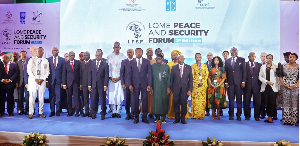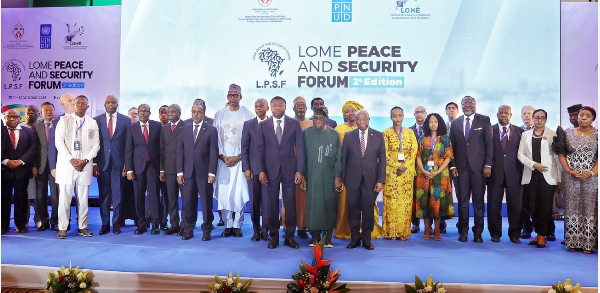 Heads of State, seasoned mediators, and security experts pose fo a photo at a forum in Togo
Heads of State, seasoned mediators, and security experts pose fo a photo at a forum in Togo
Africa’s path to lasting peace and stability may lie not in imported solutions but in its own time-honoured traditions of conflict resolution—methods that once calmed even the fiercest rivalries.
This idea took centre stage at the Lomé Peace and Security Forum (LPSF) in Togo last weekend, where heads of State, seasoned mediators, and security experts gathered to confront a familiar challenge: peace agreements that falter because they fail to take root locally.
Speakers argued that traditional practices—such as gathering warring sides under a tree to hear their stories mediated by local elders, or encouraging people-to-people exchanges—may prove more durable than externally imposed solutions.
Hosted by the Government of Togo and the United Nations Development Programme (UNDP), the Forum spotlighted ongoing conflicts in the Democratic Republic of Congo, insurgencies in the Sahel, and the crisis in Sudan. Leaders acknowledged that one of the core problems is the lack of local involvement in crafting solutions.
“We must be the main actors of our own security. Too often, our continent has been seen as a theatre for external rivalries,” said Faure Gnassingbé, President of Togo, during the opening ceremony on Saturday. “Our problems have been analysed from other capitals, and solutions decided and imposed from other forums. But the world is changing, and that model is over. The future of African security will be played out first and foremost here, on our continent.”
Now in its second edition, the LPSF aims to serve as a platform for African-led peace proposals. This year’s theme was “Africa Facing Complex Security Challenges: How to Strengthen and Sustain Peace and Stability in a Changing World?”. Leaders admitted that weak national capacities in military leadership, diplomacy, and regional mechanisms have often opened the door to foreign interference.
“Sustainable peace is built through local cohesion. Peace cannot be decreed; it must be built—and it is built through inclusion and social justice. The conflicts we face often have their origins in territorial inequalities, social frustrations, or political exclusions,” President Gnassingbé added.
The Forum drew notable figures such as Nigeria’s former President Olusegun Obasanjo—who helped broker peace in Ethiopia’s Tigray region—Liberian President Joseph Boakai, whose country has endured civil war, and Huang Xia, the UN Secretary-General’s Special Envoy for the Great Lakes Region.
Obasanjo criticised Africa’s reliance on laws and regulations “not meant for us or by us.”
“After over 60 years of independence, is it still right to scapegoat colonial heritage or legacy? In most cases, we are treating symptoms rather than the disease,” he said. “Our disease is bad governance and mismanagement of diversity. It is a failure to understand development, and a tendency to live by received ideas and other people’s narratives about us. We must take responsibility for our destiny.”
He called for moral rearmament and leadership that fosters good governance, inclusivity, justice, equity, and wise management of diversity.
“There is nowhere in Africa without diversity. And as long as we fail to manage it, we will continue to lack peace, stability, predictability, development, and progress.”
Obasanjo urged African nations to raise peace resources internally and recognise diversity as a “basic foundation for peace, security, and prosperity.”
Peace and security experts agreed that one of Africa’s greatest challenges lies in formulating policies that are later ignored. Abdisaid M. Ali, chairman of the LPSF, argued that true sovereignty is not declared on paper but built through action.
“Sovereignty is made by what we build, not what we write. It may be declared on paper, but it must be realised in practice,” said the former Somali Foreign Minister.
During panel discussions, experts stressed that lasting peace in the Congo must begin locally.
“We cannot expect true peace without a local foundation. This is crucial, and Africa’s leaders must now embrace this approach,” said Professor Morten Boas of the Norwegian Institute of International Affairs (NUPI), during a session on“Building a Future of Peace in the Great Lakes Region: Opportunities for Sustainable Stabilisation and Enhanced Regional Cooperation”.
In the DRC, Boas argued that mediators must revisit the root causes of the conflict that began in 1999—a resource struggle among ethnic groups that has since escalated and enabled external profiteering.
“National and regional stakeholders must collaborate on local peacebuilding. This will foster trust.”
Experts also noted that weakened governance has allowed youth populations to be exploited in conflicts. However, they emphasised that States cannot outsource solutions to international organisations.
“It is the responsibility of States and governments to ensure that youth are not abused but engaged positively. Governance issues fall squarely within the remit of national governments. Regional and international organisations can only support the stability of the region,” said Said Djinnit, former African Union Commissioner for Peace and Security.
